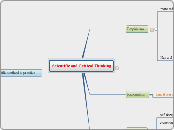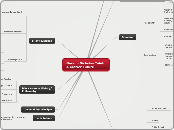Scientific and Critical Thinking
they are the same but critical thinking deals with life and society while scientific thinking deals with investigating nature.
scientific method in practice
6.constructing theory
5.test fails
back to step '3'
4.testing hypothesis
3.proposing hypothesis
2.gathering information
1.stating the problem
Skeptisism
constant questioning of one's beliefs & conclusions
accept things as true only baced on
Logical Arguement
Emperical Evidence
test your beliefs against objectives
knowledge claims by self or others must be questioned
self-deception/deception by others: common human failings
Rationalism
logical reasoning
struggle with one's will,subjective beliefs, emotions and feelings
must be learned through formal education
cannot develope & improve it on their own
not born with it
not used by most people
Empiricism
can be seen, heard, touched, tasted, smelled
Natrural evidence: Evidence found in nature
Naturalism
rejects
beliefs based on Dogma
supernaturalism
absolute truth
emphsises strong connection between science & nature
relies on natural evidence
more reliable than:
authoritarian evidence
emotional evidence
spectral evidence
revelatory evidence
circumstancial evidence
testimonial evidence
hearsay evidence









